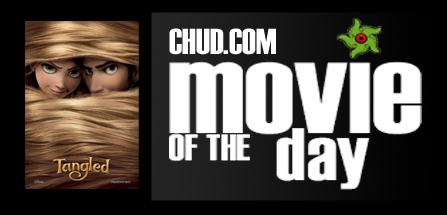
The Film: Tangled (2010)
The Principles: Nathan Greno and Byron Howard (Directors). Mandy Moore. Zachary Levi. Donna Murphy. Ron Perlman
The Premise: A baby princess is born with the healing power of the sun running through her luxurious blonde hair, so naturally an old lonely woman kidnaps her and locks her away to raise as her own personal fountain of youth. Until she escapes. In other words, ya know, it’s Rapunzel.
Is It Good: Yes indeed. It’s very good, actually. The story is breezy, tight and briskly paced, the animation is stunningly beautiful, the performances are genuine and full of life, the songs are cute, creative and catchy and there’s an amazingly sharp sense of humor running all throughout it that’s equal parts self-aware and straight-forward. Mandy Moore brings a lot to Rapunzel having both a high-profile acting and singing career, Murphy sizzles as old Mother Gothel and Maximus the horse is amazing on pretty much every visual level.
So yeah – it’s really good. And I could just leave it there…but what the hell kinda write-up is that? I’ve seen it twice now and while the first time through I was distracted by the charm of it all, on a rewatch I started looking at it a little deeper and found myself really interested in what it seemed like it was trying to say. We know that Mother Gothel isn’t Rapunzel’s mom, but she’s saddled with all the parental emotional baggage. It’s not hard at all to look at her forcing Rapunzel to stay in the tower forever so she can use her magical hair to stay young as a metaphor for every parent’s fear that your child being old enough to strike out on their own is the brightest and clearest glimpse you‘ve ever had of your own mortality. It‘s an extremely emotional and honest parenting trait and it‘s rather fascinating that they made such a point to project it onto Gothel after they made a point to let the audience know that Rapunzel wasn‘t hers.
And it doesn’t stop with that. There’s a wonderful scene after Rapunzel first leaves the tower that has her fighting a hard-fought battle between her joy at venturing out and her guilt over disappointing her “mother” and you feel it because it’s real. It’s everything we went through at that age and it’s given real weight because of conversations that Rapunzel and Gothel had had earlier about whether or not Rapunzel was able to handle what was out there in the real world. Gothel had her own selfish reasons, yes, but it doesn’t require much of a leap to see right through that to the emotional core of the situation. Rapunzel has (literal) stars in her eyes, she knows there’s a whole different life out there for her in a place where she fits in and she’s trying her hardest to convince her Mom that she’s ready and that she can handle it. Granted, it’s not a story that hasn’t been told a hundred times, but it’s honest and you can feel it between these two characters and I don’t think that it was an accident to make that connection so strong. But again, at the same time, as strong as it is, it’s so hard to fully connect to it because of what we learned in the prologue. And the fact that the audience does know the truth gives just the tiniest bit of credence to the possibility that there‘s an undercurrent here that says you shouldn’t trust authority.
But then again, it’s rather telling that Rapunzel’s “real” parents barely exist as characters as their only job as parents is to look concerned and hug her. Every kid goes through that moment where they say “Man, I wish _____ were MY parents!” It’s interesting to wonder if this is Greno and Howard indulging in that fantasy and enabling Rapunzel’s own similar outburst. Is Tangled just a look inside the mind of a teenage girl throwing a temper tantrum? Is Gothel really a struggling, single mother, scared to send her daughter out into the world, but filtered through the exaggeration of a self-assured, but rather naive, 18-year-old who’s convinced that her Mom’s just a drag who doesn’t understand her? The fact of the matter is that every single bit of the movie can and does support it. From the prologue about who she is and where she came from (what disgruntled kid hasn’t imagined their own version of that story?) to the fact that she can make Ryder change simply because she loves him to the song-and-dance at the seedy bar to everything else. There’s every piece of evidence to support the possibility that maybe, just maybe, this is all in the head of a teenage girl who’s pissed off at her mom and writing in her journal with her headphones on.
I mean it isn’t, obviously. But it’s fun to think about, no?
Is It Worth A Look: Yep! Again, it’s really good. And, as an aside, even if you take the movie at face value (which is perfectly acceptable – again, it’s so damned charming), I do like that the marriage is an afterthought of the happily ever after, as it’s a nice change of pace from what the primary motivation of most of the other Disney Princess films.
Random Anecdotes: There’s a thread in the forums where a lot of awesome readers recommended movies for us to give the MOD treatment. This wasn’t one of them, but it’s the only thing I’ve found time to watch recently. So don’t hate me guys! I’m not ignoring your suggestions! Also, there’s a little bump in front of the film that declares this Disney’s 50th animated motion picture. Neat!
Cinematc Soulmates: The Little Mermaid. The rest of the Disney Princess stable. At least one episode of every family sitcom ever.